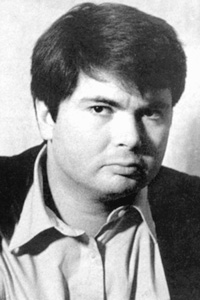Air Crash in Moscow: Accident or Terrorism?

Nine persons died when Yak-40 crashed after takeoff at 08:43 Moscow Time at Sheremetyevo-1 Airport on March 9. Interfax reports that Flight 9651 Moscow-Kyiv crashed immediately after takeoff for reasons that are still to be determined.
The established names among the passengers include Artem Borovik, president of the Sovershenno Sekretno [Top Secret] holding company and a noted Russian journalist, two of his aides, and Ziya Bazhayev, president of the Alliance Group.
The presence onboard of the well-known journalist and businessman has given rise to quite a number of leads. As always in such cases, sources asking to remain unidentified insist that there was an explosion before the plane caught fire. The Ekho Moskvy (Moscow Echo) Radio Station says the crash could be the result of an act of terrorism. Sheremetyevo-1 management rejects such allegations, insisting the onboard systems developed malfunctions (to be ascertained after decoding the black box). Rudolf Teimurazov, deputy chairman of the Intergovernmental Aviation Committee in Moscow, informed the jet liner was to be discarded next July. Its flying record numbered 24 of 25 admissible years, meaning that its technological potential was almost exhausted. Mr. Teimurazov, however, said he was sure the pilot, Sergei Yakushkin, was not to blame. He was a first class pilot with a log of some 7,000 hours in the air. Some light could be shed on the case after establishing the plane’s ownership and who chartered the flight, yet here one finds more questions than answers. While the Yak-40’s registration presents no problem (Aviation Enterprise of Vologda), no one seems to know who chartered the flight. AFES Co., the plane’s insurer, says the flight could have been chartered by Aerotex Co. which had, allegedly, leased it on previous occasions. This information has not been corroborated.
Artem Borovik, journalist and businessman, was born on September 13, 1962. Graduate of International Journalism Department, Moscow Institute for International Relations. Since 1991, anchored RTR’s journalist investigation program “Top Secret” and was chief editor of the title weekly.
Nikolai Ziatkov, editor of the weekly Argumenty i fakty who knew Borovik well, says Artem was not much for mixing with celebrities or other journalists. Always remaining somewhat aloof, getting any newsworthy information out of him and about him was a very big problem. A while ago, however, he confided in Ziatkov, saying he had to hire bodyguards because the kind of publications his weekly carried caused anger in certain quarters, including the underworld.
Aleksandr Ryklin, observer with political desk of Moscow’s Itogi magazine, agrees that Sovershenno Sekretno carried hot critical stories, adding that the situation in the Russian media is quite tense (Artem Borovik recently spoke of the redistribution of Russian information space in an interview with NTV). However, Mr. Ryklin does not think this reason enough to start hunting down journalists. Even if the terrorist act lead proves valid, he thinks the target was Bazhayev, not Borovik.
Alliance Group President Ziya Bazhayev is very well known in the Russian oil business. In 1995-96, after the first Chechnya War, he was assigned by the Russian government to restore Chechnya’s oil complex. He was president of the South Oil Company (of Chechnya) and then of the well-known oil company SIDANKO. In April 1998, he became president of the Alliance Group Company specializing in anticrisis programs for the oil and chemical industries. Since October 1999, Alliance Group has been the executive manager of the government interest in the Kherson Oil Refinery, acting on behalf of Kazakhoil Co. and the governments of Ukraine and Kazakhstan. He was on the “cadre reserve” lists of the Russian Ministry of Fuel and Energy and is said to have been considered a candidate for the ministerial post.
Sergei Lakunov, head of the Alliance Group’s press service, told The Day that Mr. Bazhayev was flying to Kyiv on a business trip in line with the Kherson Refinery’s anticrisis program, nothing out of the ordinary. He added that Borovik and Bazhayev were good friends, and that Bazhayev supported Borovik’s idea to publish the newspaper Versiyi [Versions] in Ukraine. Mr. Lakunov insisted that Alliance Group and the Sovershenno Sekretno holding company were planning a cooperation agreement, and not only with regard to the Versiyi. He further informed that Ziya Bazhayev wanted to fly to Kazakhstan from Kyiv to take part in the talks between the governments, scheduled for March 10.
Sources close to the Kherson Oil Refinery believe that Bazhayev’s death (after UNIAN’s allegation it was an act of terrorism) will not in any way affect oil supplies (100,000 tons monthly, albeit somewhat lower than envisaged by the contract). The said sources, however, point to certain difficulties Alliance Group has encountered selling oil in Ukraine.
Lavrentiy Malazoniya, an independent TV producer, believes Bazhayev and Borovik were flying to Ukraine to negotiate projects developed by the publishing holding company Sovershenno Sekretno. Apart from the publishing business, Artem Borovik was quite active in television (e.g., NTV version of the Sovershenno Sekretno). In the latest “Anthropology” episode with Dibrov on NTV, Artem Borovik declared he was collecting data on the Mykolayiv Alumina Plant, and that he intended to lobby for Russian business interests.
The Journalists’ Union of Russia issued a statement mourning the tragic death of Artem Borovik.
№8 March 14 2000 «The
Day»
In using our publications, reference to The Day is
mandatory. © "День"
Newspaper output №:
№8, (2000)Section
Day After Day





